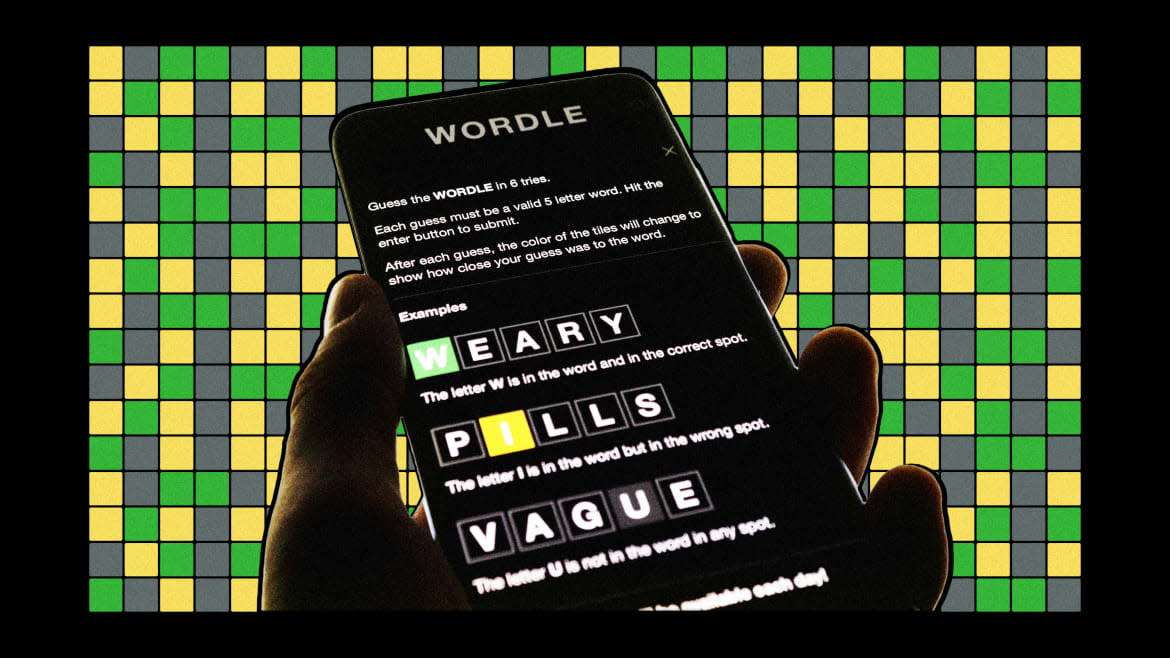Shrinks Think New York Times’ Wordle Is Becoming a Problem

Wordle is actually making us crazy.
Therapists tell The Daily Beast that some of their patients are confessing just how much time they are spending on The New York Times Games app and how it’s messing with their mood or mental health.
“When I see it as a problem is when a patient says ‘I was not able to complete my tasks at work today because I spent so much time on Wordle’ or when they say they were asked to go to dinner with their friends but chose to stay home to play Connections,” New York psychologist Jennifer Gittleman said.
Journalist Tess Owen tweeted on Wednesday that her therapist said the Old Gray Lady’s games—which include Spelling Bee, Connections, and the beta-testing Strands—are becoming “a problem” for patients, including her.
“[S]he asked me how long i spent every day doing them and i LIED,” Owen wrote. “‘[U]h huh, so to recap, you're doing the sudoku, as well as the crossword, the spelling bee, wordle, connections and letter boxed every day, in just one hour?’ *writes in notebook*.”
“Haven’t played nyt games for a few days and can’t tell if that means my mental health is getting better or worse,” another puzzler wrote on X earlier this month.
(Full disclosure: this reporter cannot fall asleep until she and her husband have completed the mini crossword every night.)
Wordle Users Lose Their Minds Over Torturous Puzzle
While the Times, like many newspapers, has had a crossword for eight decades, it was Wordle, which it acquired in January 2022, that transformed its game… game.
Brooklyn software engineer Josh Wardle built the game for his partner and kept it in their inner circle until he released it to the world in October 2021. After a meteoric rise in popularity, the Times shelled out a reported low seven figures for it months later.
In its May 2022 quarterly earnings report, the outlet reported that the free game “brought an unprecedented tens of millions of new users to The Times, many of whom stayed to play other games which drove our best quarter ever for net subscriber additions to Games.” The app, which is fully accessed through a $6-a-month subscription, was downloaded 10 million times last year, Axios reported.
A Times spokesman told The Daily Beast its games were played over 8 billion times last year—with Wordle the most popular. (There are at least 90 spin-off versions of the single-player game on the web, including Taylordle, a variant for Taylor Swift fans, and Nerdle, for math enthusiasts.)
Online brain games might seem like a healthier habit than doom-scrolling the night away, but several health professionals told The Daily Beast that the competitive, addictive, and time-consuming nature of these games could come at a price.
“Our brains have not evolved to keep up with technology,” Dr. Clifford Sussman, a psychiatrist in Washington who specializes in internet and gaming addiction, said.
“Technology today is essentially a shortcut to everything and our brains can’t resist that. And the shortcut to a sense of accomplishment while playing one of these online games releases dopamine into the brain,” he added. “Seeking dopamine release could lead to compulsive and sometimes problematic behaviors.”
Gittleman said some of her patients have expressed anxiety about the puzzles—because they cannot finish them or don’t have enough time to do them every day. She said Wordle and its cousins can be a helpful outlet for stress and promote a sense of accomplishment in some people. The problem arises when the dopamine hit “gets in the way of regularly scheduled programming.”
The two biggest indicators that the games are a net negative are anxiety or irritability about a game’s outcome or not being able to play, she said.
“If I hear those, I would recommend really setting a time limit for the games [during a time of day] that wouldn’t interfere with getting things done,” she added. “Maybe it’s a few minutes in the morning. It depends on your schedule.”
Another therapist, who did not wish to be identified for her patient’s privacy, told The Daily Beast she has seen anxiety in patients who fear being asked about their scores by their peers or comparing their own speeds with those posted on social media.
“People are thus looking for external validation or something from other people rather than looking for something within themselves perhaps,” Dr. Lauren Sweitzer, a psychologist who specializes in emotionally focused therapy, said. “On the flip side, it’s self-judgment when we feel like we sucked at something people are doing.”
The Times says it’s not trying to drive people nuts. A spokesman told The Daily Beast that the “puzzles are based in wordplay and logic, and provide stimulating experiences that make you think about language and the world. They also create deliberate moments for sharing with friends and family. We believe deeply this is a type of play that is healthy and brings people together.”
Since there is no indication that games-mania is dying down, Gittleman just wants her patients to remember it’s supposed to be fun.
“People just need to remember, it’s just a game,” she added.
Get the Daily Beast's biggest scoops and scandals delivered right to your inbox. Sign up now.
Stay informed and gain unlimited access to the Daily Beast's unmatched reporting. Subscribe now.

